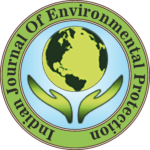IJEP 42(9): 1122-1225 : Vol. 42 Issue. 9 (September 2022)
Komal Rakwal and Amitabh Vikram Dwivedi*
Shri Mata Vaishno Devi University, School of Languages and Literature, Katra – 182 320, Jammu and Kashmir, India,
Abstract
From air we breathe to water we drink; we are using earth’s resources at an expandable rate and in return, we are producing excess carbon dioxide by cutting trees, urban and rural development and climate change. There are certain questions that are raised and seek to address the relationship between man and nature. The paper will hopefully contribute towards the exposing and undoing of the various kinds of denialism that have held us in its tight hold. Ecocriticism continues to support and facilitate attempts to establish a sense and morally sustainable set of relationships between us, human beings and other inanimate and animate environments. human beings have been continuously destroying their own planet as they may not continue to exist. The paper highlights the Covid-19 crisis and our impact on environment. The present paper gives a summary of coronavirus, its existing state of spread and environmental and ecological risks resulting from the pandemic.
Keywords
Ecocriticism, Covid-19, Pandemic, Environment, Pollution, Crisis, Conservation
References
- Glotfelty, C. and H. Fromm. 1996. Landmarks in literary ecology. The Ecocriticism Reader: Landmarks in literary ecology, University of Georgia Press, Athens.
- Rueckert, William. 1996. Literature and ecology: An experiment in ecocriticism. Iowa Review. 9(1): 71-86.
- Love, A.G. 2003. Practical ecocriticsm: Literature, biology and the environment. University of Virginia Press, London.
- Ali, I. and O.M. Alharbi. 2020. Covid-19: Disease, management, treatment and social impact. Sci. Total Env., 728:138861. DOI: 10.1016/j.scitotenv. 2020.138861.
- Thakur, Kailash. 1997. Environmental protection law and policy in India. Deep and Deep publications.
- Coronavirus outbreak in India. Available at : http://www.covid 19 india.org.
- Xiao, F., et al. 2020. Evidence for gastrointestinal infection of SARS-CoV2. Gastroenterol., 158(6): 1831-1833. DOI: 10.1053/j.gastro.2020.02.05 5(e3).
- Tian, S., et al. 2020. Characteristics of COVID-19 infection in Beijing. J. Infect., 80(4):401-406. DOI: 10.1016/j.jinf.2020.02.018.
- WHO. 2020. Coronavirus disease (COVID-2019) situation reports. World Health Organization, Geneva. Available at : https://www.who.int/emergencies/novel-Coronavirus-2019.
- Guo, W., et al. 2020. Diabetes is a risk factor for the progression and prognosis of COVID-19. Diabetes Metab. Res. Rev. DOI:10.1002/dmrr.3319.
- Qin, C., et al. 2020. Dysregulation of immune response in patients with COVID-19 in Wuhan, China. Clin Infect. Dis. DOI:10.1093/cid/ciaa 248.
- Adamson, Joni. 2001. A place to see: Self-representation and resistance in Leslie Marmon Silko’s almanac of the dead. In The American Indian literature, environmental justice and ecocriticism. University of Arizona Press, Tuscon.
- Chand, S., et al. 2021. Updates on biomedical waste management during COVID-19: The Indian scenario. Clinical Epidemiol. Global Health. 11:100715.
- Singh, A., S. Unnikrishhnan and S. Dongre. 2019. Biomedical waste management in India. Awareness and novel approaches. Biomed. J. Sci. Tech. Res. DOI. 10.26717/BJSTR.2019.13.002424.
- Yadav, S.K., I. Chakraborty and S. Banerjee. 2020. Bio-medical waste management in India: Contemporary approaches and way forward. EPRA Int. J. Multidiscip. Res. DOI:10.36713/epra 2013.
- CBCB. 2019. Annual report 2018/2019. Central Pollution Control Board, New Delhi, India.
- Rao, V.V. and S.K. Ghosh. 2020. Sustainable bio-medical waste management- case study in India. In Urban mining and sustainable waste management. Springer, Singapore. pp 303-317.
- Sharma, S., et al. 2020. Effect of restricted emissions during Covid-19 on air quality in India. Sci. Total Env., 728:138878.
- Atolani, O., et al. 2020. COVID-19: Critical discussion on the applications and implications of chemicals in sanitizers and disinfectants. EXCLI J., 19:785.
- Mahmood, A., et al. 2020. Covid-19 and frequent use of hand sanitizers: Human health and environmental hazards by exposure pathways. Sci. Total Env., 742:140561. DOI: 10.1016/j.scitotenv 2020. 140561.
- Gameson, A.L.H. and M.J. Barrett. 1958. Oxidation, reaeration and mixing in the Thames estuary. Oxyg Relationship Streams. 898:63-93.
- Van Baneden, G. 1952. Biological aspects of the problem of detergents in domestic sewage. Bull. Cebedeau. 17:159-164. DOI: 10.5772/61250.
- Mckibben, Bill. 1989. The end of nature. Random House, New York.
- Kerridge, Richard. 1998. Introduction. In Writing the environment. Ed Richard kerridge and Neil Sammells. Zed Books, London.
- CPCB. 2020. Annual report 2019-20. Central Pollution Control Board, New Delhi, India.
- McBay, A., L. Keith and D. Jensen. 2011. Deep green resistance. In Strategy to save the planet. Seven Stories Press, New York.
